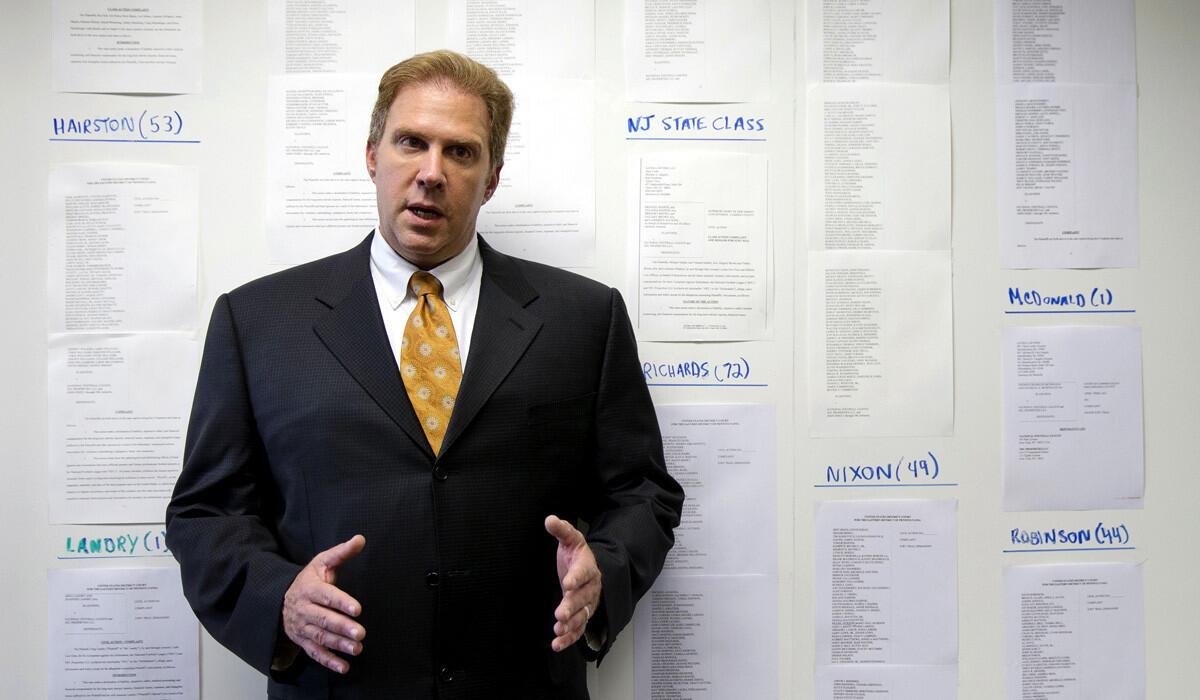About 3 in 10 ex-NFL players qualify in concussion deal, court data show

- Share via
Almost 6,000 of more than 19,000 former NFL players will develop cognitive problems serious enough to be compensated under the league’s proposed concussion settlement, according to documents filed Friday in U.S. District Court in Philadelphia.
About 3,600 ex-players would get money in the deal while another 2,300 would be eligible for awards but decline to participate, said an actuarial report prepared for the retired players. The NFL numbers were similar.
Compensation under the settlement would total $950 million, the study on behalf of the retired players estimated, while the NFL’s report projected $900 million.
The reports were among hundreds of pages of documents U.S. District Judge Anita Brody ordered released after repeated requests by attorneys, retired players and media.
Completed in February, the reports estimated 60% of ex-players would participate. Both reports found the math behind the original deal to be sufficient.
Brody granted preliminary approval to the settlement in July, but questions from attorneys and retired players about the settlement’s terms haven’t abated.
In a statement Friday, the co-lead counsel for the retired players, Christopher Seeger and Sol Weiss, called their report’s estimate of widespread cognitive issues “startling” and said the deal needed to be approved.
Their study projected that 3,047 ex-players will be diagnosed with either Alzheimer’s, amyotrophic lateral sclerosis, known as Lou Gehrig’s disease, or Parkinson’s over the settlement’s 65-year life.
The NFL’s actuaries believed the rates of such diseases, particularly among ex-players under age 65, are “significantly higher” than the general population and occurred at much earlier ages.
But a sliding scale based on the age when ex-players were diagnosed and the number of seasons in the NFL will dramatically cut the average award amount. Retirees aren’t eligible for the maximum award unless they have played five seasons or more — 60% of those expected to be compensated have less — and were diagnosed at age 45 or younger.
“Adjusting for age at diagnosis significantly reduces the average compensation below the maximum award levels,” the retired players’ report said.
The numbers are stark.
With Alzheimer’s cases, the average expected payout goes from the maximum of $3.5 million to $190,000 when age and experience are factored. For ALS, the average payout will be $2.1 million, down from the maximum of $5 million.
Suffering a stroke or sustaining previous traumatic brain injury could result in 75% penalties.
While the families of ex-players diagnosed with chronic traumatic encephalopathy after death are eligible for up to $4 million, ex-players with postmortem CTE diagnoses after the deal’s preliminary approval July 7 won’t be compensated.
“The model assumes that no other players will be diagnosed with CTE,” the NFL report said in a footnote.
The payouts for CTE are expected to total $64.9 million, the retired players’ report said.
The estates of ex-players who died before 2006 aren’t eligible for awards unless the local statute of limitations allows a claim.
Any money won’t come quickly. Though plaintiffs’ attorneys have pushed for a fast approval of the settlement to help ex-players fighting serious disease, their actuarial report estimates an average 12-month wait for payment after filing a claim. In some cases, that wait could be 24 months.
The reports provide the first in-depth look at the mechanics of the settlement as public contention over the settlement has grown in recent weeks.
This month, the family of late San Diego Chargers linebacker Junior Seau’s announced their intention to opt out of the deal and pursue litigation against the NFL on their own. Pro Football Hall of Famer Joe DeLamielleure said he’ll tell everyone he knows to object.
And Thursday, the attorney for the family of late Chicago Bears defensive back Dave Duerson filed an unusual motion to depose Seeger about the circumstances of the settlement’s negotiation.
“Meaningful and informative communication between Mr. Seeger and the majority of other attorneys representing thousands of clients has been virtually non-existent,” attorney Thomas Demetrio wrote in an affidavit. “We still lack an informed understanding of the settlement discussions and negotiations. Indeed, we have zippo understanding.”
Demetrio, who sought the actuarial data since January, believed more information is needed before the Oct. 14 deadline for players to opt out of the settlement or object.
The U.S. Court of Appeals for the 3rd Circuit denied a request Thursday by seven ex-players who sought the court’s intervention in the settlement over dissatisfaction with the deal that included the CTE compensation.
The release of the actuarial reports isn’t enough for them, either, with a fairness hearing on the settlement scheduled for Nov. 19 in Philadelphia.
“We will be pursuing all avenues to explore how a substantial percentage of the class had their rights bargained away without adequate representation,” said Steven Molo, an attorney representing the seven ex-players. “We are asking the court for discovery into how this rotten deal was struck.”
Twitter: @nathanfenno
More to Read
Go beyond the scoreboard
Get the latest on L.A.'s teams in the daily Sports Report newsletter.
You may occasionally receive promotional content from the Los Angeles Times.











